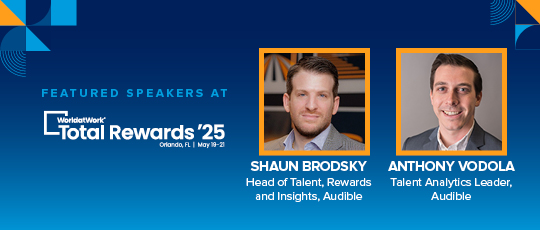There has never been a better time to be in human resources (HR) and total rewards (TR) than today, according to WorldatWork CEO Scott Cawood.
At a time when the landscape around human resources, total rewards and our workplaces is rapidly changing, he sees abundant opportunity for advancement — both for ambitious practitioners and the state of work itself. These are themes Cawood captures in his new book, “The New Work Exchange: Embracing the Future by Putting Employees First.” (All proceeds for this book benefit the WorldatWork Foundation.)
During a recent engaging discussion with #evolve, Cawood shared his own advancement journey from HR leader to CEO, what he looks for in HR/TR leaders and what advice he would give to those leaders who hope to someday run their own organizations.
What is a common career path for executives who become CEOs? How does that path influence the way they think and the way they approach the business?
There are plenty of paths that lead up to it. The CEO has to deliver, or build, or create momentum, right? So, some of the early roles that CEOs get involved in are obviously business development, sales or engineering. Consulting — because you’re solving a lot of problems — is another great path that we’ve seen a lot of CEOs take. The ability to handle complex problems, the ability to inspire others, to both create and handle tension in the organization — those are all pretty broad skills involving really complex problem-solving. Your ability to work with and inspire people to the right destination is key.
In your experience, how common is it for CEOs to come up through the ranks of TR/HR?
It’s probably most common for a person to assume the role after doing a stint in HR. You do HR for two or three years; you might do finance two or three years, marketing two or three years — you’re rotating around to learn the organization.
Direct jumps from HR to the CEO job, in particular, are fairly infrequent, at least at the moment. Many HR roles are not broad. They’re fairly specific. And it’s not because they’re in HR that they’re so specific, it’s just that some organizations have their HR teams focus just on HR. At the end of it, you want a CEO who understands: How does the organization make money? If HR is not exposed to that — because they’re not cross-functioning, they’re not working in different parts of the organization, or they may not be exposed to it by the very nature of the job — then it’s hard to put an HR person in the role of CEO, unless that person already has that core operational background, which is kind of essential to the success of the organization. My hope is that we can broaden some of the HR roles, so they are involved more in the business side, and they’re not so specifically focused.
How does a solid background in TR or HR help a CEO lead an organization? How has your background helped you as a CEO?
For me, my background in HR really has been one of my biggest strengths in the CEO job because I do understand, fundamentally, the impact that decisions have on people. (Before joining WorldatWork, Cawood spent two different stints absorbing the unique and renowned work culture of W. L. Gore & Associates. He was also the vice president of global talent at both Revlon and the Great Place to Work Institute, which researches and selects Fortune magazine’s 100 Best Places to Work. At one point, he joined a software company as its chief human resources officer and received an unexpected promotion to the role of president.)
For example, you want to include somebody in a decision before you just randomly make it, and it impacts them. Those are all pretty big nuances about how to run a business, especially if you’re trying to disrupt a market or you’re trying to get momentum created. I leverage my HR skills all the time in my conversations, in my thinking and in my strategy.
Now that you are leading an organization, what do you look for in HR/TR leaders? What qualities or skills do you value most?
The skills and qualities that I value most are the ability to influence — to drive both the business and the people experiences so they blend together and ultimately create momentum. I have been, in probably the last decade, looking for HR and total rewards people who can find that blend between the numbers and the people. How do we make that work more seamless, more effective, quicker? How do you create that momentum so that potentially we’re taking fewer steps forward, but we’re taking more steps together forward? I’m looking for the HR and the total rewards team to be able to give me the data to understand, are we progressing in the right way? And then the second part is, I believe HR and TR leaders can’t just work with the current workforce that we have today. They have to be projecting what the decade forward is going to look like as it relates to what the culture needs to be looking like.
HR and TR leaders are in a unique position in that they often help provide coaching and other development for rising CEOs. What advice can you offer to HR/TR leaders in this position?
Because so many CEOs have come from the financial background, the sales background or the business development background, they may not have cultivated their people skills and their ability to engage, inspire and also bring together people in meaningful ways. That role for HR and total rewards is absolutely available right now. I think that folks in that space can continue to push CEOs so that the CEOs broaden their people skills and try to get to that blend I keep talking about between people and numbers.
What advice would you give to aspiring HR/TR leaders who wish to someday run an organization?
For HR leaders, becoming more skilled in total rewards is the key next move. You’ve got to be good at understanding the numbers of the business, and a large part of those numbers is how you pay people. How do you incentivize people? How do you reward people? And how do you retain people? All of which could be heavily influenced by your total rewards program.
For both HR and TR leaders, it is important to...
Learn the business from a 360-degree point of view. It’s not just enough to understand how to read a balance sheet. You need to understand the nuances that cause that balance sheet to get unbalanced. And that to me is what’s going to make or break HR getting into the CEO role. Are your margins too low? Are your expenses too high? Whatever the thing is, being able to see it and respond to it is good.
My other piece of advice: I don’t care what stage you are at in your career, get your own personal board of directors. It’s a small group of people who are willing to truly tell you what you need to hear when you need to hear it.
My personal advice would be, don’t ever lose your ability to care more about people than a process. In the end, you will ultimately never make the bad choice if you continue to care more about people and you choose that over process.
What are some of the most important lessons you’ve learned in your career?
One is to lean into your discomfort. I think as humans, we love to be comfortable, so we default to, ‘That’s just how we do it here, so I’m not going to put up the big fight.’ But the value of your business today, and the value of your ability to influence and interact, comes from when you are in that discomfort zone, not the comfort one.
I believe another lesson I’ve learned is that 95% — maybe even 96% — of every job on the planet can be learned. Get good at developing people, and yourself, as well. You should never stop picking up new skills and learning.
I talked about spending time on the person, not so much the problem — that’s a life lesson. I would always in your career listen more and talk less, especially if you get into the CEO role. From a personal perspective, I would encourage people to constantly be you and not them.
And my last one: When the tensions happen in organizations, there’s a tendency to say, ‘Because I’m the CEO, that’s why.’ And that’s always the worst thing you could do because you always have the power to override and tell someone, ‘Go do this because I said so.’ It also doesn’t reflect the true togetherness that you need in an organization. So, you want to focus on that task, and you want to focus on that relationship. And when you have to choose, choose the relationship.
Editor’s Note: Additional Content
For more information and resources related to this article see the pages below, which offer quick access to all WorldatWork content on these topics:




